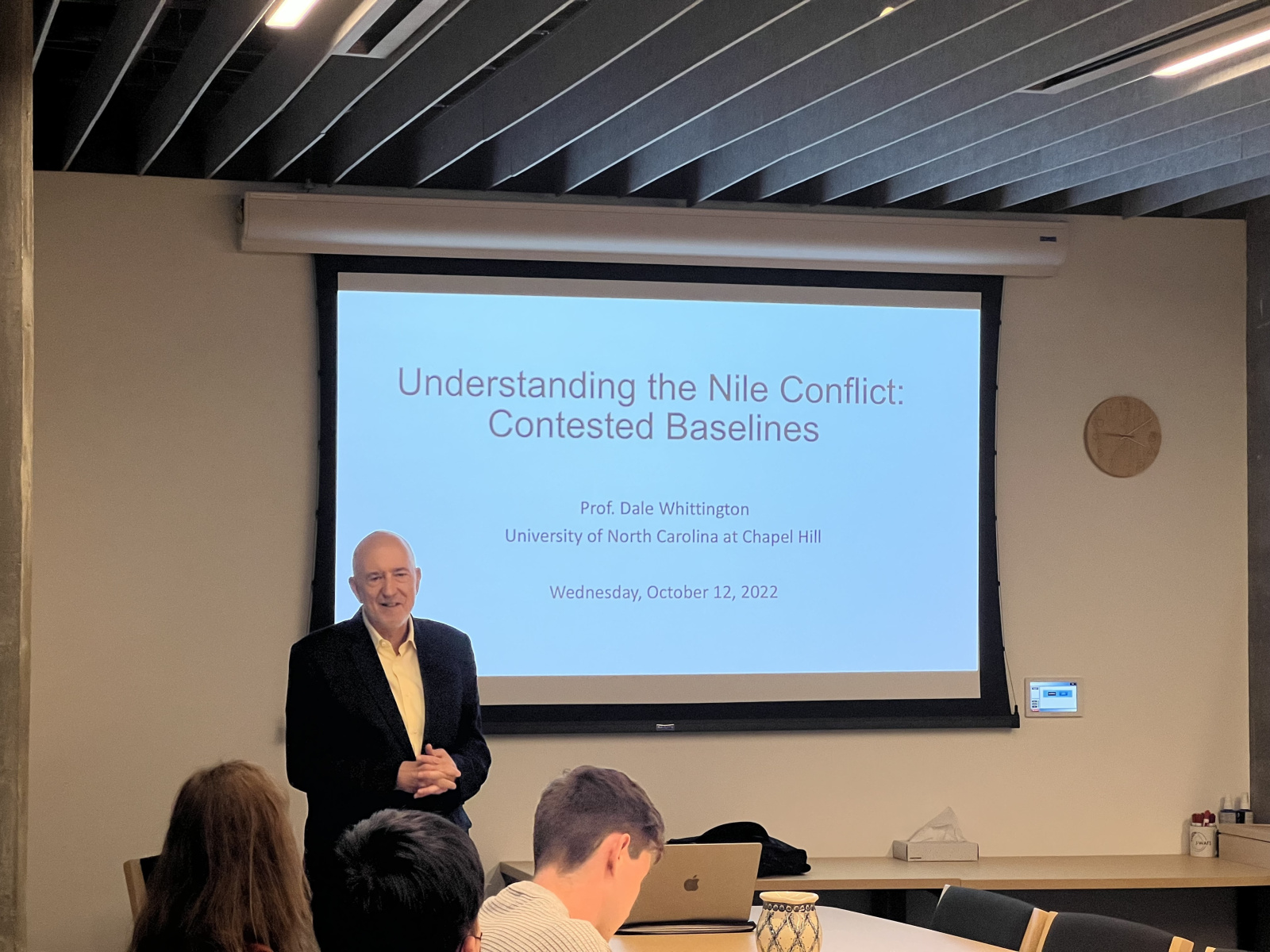News J-WAFS hosts first lecture on the Grand Ethiopian Renaissance Dam
Carolyn Blais, J-WAFS October 21, 2022

On Wednesday, October 12, 2022, J-WAFS hosted a lecture on the Grand Ethiopian Renaissance Dam, also known as the GERD. The lecture was the first in a three-part series on the GERD, given by J-WAFS visiting scholar Dale Whittington. Whittington is a professor in the Departments of Environmental Sciences & Engineering and City & Regional Planning at the University of North Carolina at Chapel Hill.
The late Ethiopian prime minister Meles Zenawi announced in 2011 that Ethiopia would build the Grand Ethiopian Renaissance Dam. The GERD is slated to be the largest hydroelectric power dam in Africa, situated on the Blue Nile immediately upstream of the Ethiopian-Sudanese border. It is now approximately 75% completed. Since Zenawi’s announcement in 2011, there have been nearly continuous negotiations between Ethiopia, Sudan, and Egypt. However, the three countries have not yet been able to agree on arrangements for completing the filling and subsequent operation of the GERD. Although a central element of Ethiopia’s development plans, the GERD is a contentious project in the region. Egypt is particularly concerned about the impact of the GERD on its water supply. Ethiopia views the project as a positive, claiming it will promote economic growth for not only Ethiopia, but the entire region. However, many Egyptians see the dam as disastrous, arguing it will reduce water inflows to the High Aswan Dam Reservoir. Whittington noted that debates about the conflict are very aggressive on social media, making it difficult for decision makers and experts to understand the undercurrents in civil society about a possible GERD agreement.
Whittington contends that in order to better understand the conflict, we must first examine the concept of the “contested baselines.” He explains that the effect of a proposed or planned policy intervention such as a dam is an estimate based on a comparison of the state of the world without the policy intervention — known as the dynamic baseline — and the state of the world with the policy intervention. Because the effects of most policy interventions play out over time, this comparison requires a forecast of the dynamic baseline.
Whittington discussed three challenges for analysts in using forecasts of the dynamic baselines in a policy analysis: 1) unexamined baselines, 2) uncertain baselines, and 3) contested baselines. His focus in this first lecture was on contested baselines. The presentation highlighted two cases illustrating the challenge of contested baselines in the Nile basin. The first illustration referenced studies planned by two French firms who were hired by the Tripartite National Committee, which was established to address questions about the impacts of the GERD. To conduct their evaluation studies, the firms needed to know, “from what baseline should water deficits to Egypt be measured?” Egypt maintained that deficits should be measured from its 55.5 billion cubic meters (bcm) annual allocation in the 1959 Nile Waters Agreement. If during a prolonged drought Egypt could only release, perhaps, 45.5 bcm, then there would be a deficit of 10 bcm, and Egypt would experience a loss.
However, from an Ethiopian perspective, this 10 bcm would not be a “deficit” because the 55.5 bcm in the Nile Waters Agreement was not fair to begin with as it did not reflect “equitable use” of Nile waters. From the Ethiopian perspective, this 10 bcm should be “viewed as a reduction in an unfair gain, not as a loss.” Because the parties could never reach agreement on the dynamic baseline to be used in the evaluation studies, the French consultants could never complete their work.
In the second illustration of contested baselines in the Nile basin, Whittington describes Egypt’s “Cumulative Deficit Model.” The Cumulative Deficit Model was an Egyptian proposal for operating the GERD. In this model Ethiopia would supplement releases from the GERD if the cumulative releases from the GERD exceeded a threshold value. A GERD operating policy based on the Cumulative Deficit Model would draw down storage in the GERD during times of drought in order to ensure that over time Egypt would receive the same average amount of water as before the construction of the GERD. Ethiopia contests this proposed dynamic baseline and rejects Egypt’s framing for operation of the GERD.
To conclude, Whittington suggested that policy analysts need to search carefully for dynamic baseline assumptions, and when baselines are contested, decision makers need to understand and confront the source of the disagreement.
Whittington will give a second lecture on November 16, 2022 at 4 p.m. ET, and a third and final one on February, 15, 2023 also at 4 p.m. ET. The remaining lectures will explore these questions: